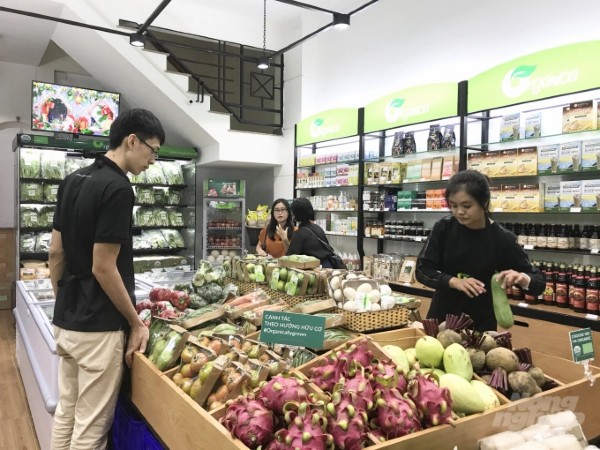May 19, 2025 | 21:04 GMT +7
May 19, 2025 | 21:04 GMT +7
Hotline: 0913.378.918
May 19, 2025 | 21:04 GMT +7
Hotline: 0913.378.918

An organic product store in HCMC. Photo: Son Trang.
Mr. Nguyen Quoc Toan, Director of the Agricultural Products Processing and Development Department, said that by the end of 2019, the area of organic cultivation had reached about 237 thousand hectares, a sharp increase compared to 53 thousand hectares a year in 2016.
Currently, 46/63 provinces are implementing organic production. 17,168 farmers and 97 businesses are organizing organic production; 60 enterprises are exporting organic products with a turnover of about 335 million USD/year.
Vietnamese organic agricultural products are consumed domestically and exported to 180 countries, including the US, EU, China, Japan, Germany, UK, Korea, Russia, Singapore, France, Belgium, the Netherlands, Italy..., the largest markets for organic agricultural products.
According to Mr. Ha Phuc Mich, Chairman of the Vietnam Organic Agriculture Association, organic agriculture is growing rapidly, especially since the issuance of Decree 109/2018 of the Government on organic agriculture. Organic production is getting more and more attention from local authorities, businesses and farmers...
The development of organic agriculture has been put in the agenda for economic development in many provinces. It shows a progress in the awareness of all levels of committees and local authorities about organic agriculture.
However, the development of organic agriculture in recent years has also been posing many problems in management, certification, inspection and supervision...
Deputy Minister of Agriculture and Rural Development Tran Thanh Nam said that it is very important to manage organic production so as to ensure that products labeled organic are actually products of organic agriculture. It is also necessary to promote the training of management staff, inspection and supervision of organic agricultural products from ministerial to local level. There should be training courses for businesses, producers and traders of organic products.
Deputy Minister Tran Thanh Nam emphasized that organic production is just one of the methods of agricultural production. It can not replace other methods of production in ensuring food security. Therefore, the development of organic agriculture in localities should be carefully planned.
Localities need to determine which areas are for organic production and which areas still maintain non-organic production methods. It is also necessary to determine which products will be organic, and which products will remain traditionally produced.
The organic agriculture development project for the period 2020-2030 that has just been approved by the Government is derived from the practice, general method and direction of the Scheme on agricultural restructuring towards increasing added value and sustainable development, implementing national target programs and bringing into play the strong potentials of organic agriculture in regions and localities, contributing to positioning and enhancing the brand of Vietnamese agricultural products on the world agriculture map, bringing Vietnam into a country with an organic agricultural production level equal to that of advanced countries in the world.
Author: Sơn Trang. Translated by Meagan Phan, Edited by Duc Huy.

(VAN) 14 out of 35 domesticated elephants in Dak Lak province have had their living conditions improved, with 11 of them currently participating in the non-riding elephant tourism model.

(VAN) Muong Nhe Nature Reserve hopes that being upgraded to a national park will lay the foundation for forest protection efforts to be carried out in a systematic, modern, and sustainable manner.
/2025/05/16/3923-2-171845_52.jpg)
(VAN) Lower costs, higher yields, and improved soil quality are outstanding benefits that soybeans bring when integrated into the crop rotation system.

(VAN) The 'For a Green National Environment' programme aims to promote a green lifestyle, support businesses in implementing ESG practices, and turn Net Zero commitments into concrete actions.

(VAN) Cold-barn systems efficiently manage environmental and temperature conditions, which aids in the prevention of respiratory diseases in pigs and protects them from the vectors that transmit African swine fevers.

(VAN) To tackle challenges, the project 'Addressing key technical bottlenecks in the grouper supply chain in Vietnam' has been underway since 2024.

(VAN) The project 'Disease-Resilient and Sustainable Cassava Production Systems in the Mekong Region', funded by the Australian Center for International Agricultural Research (ACIAR), is being implemented from 2024 to 2028.